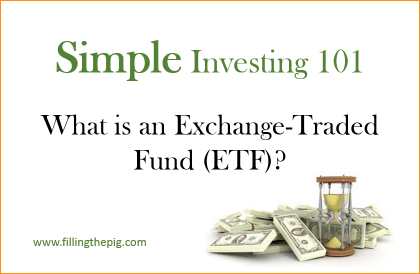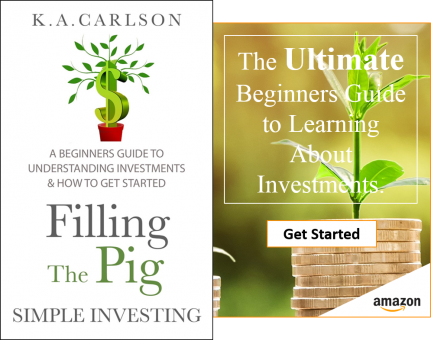What is an Exchange-Traded Fund (ETF)? ETF is an acronym for Exchange-Traded Fund and is another type of investment vehicle or security.
ETFs were created in the early ’90s as a means of providing investors with the ability to purchase a set of “pooled” investment resources – like stocks and bonds. In this respect ETFs are similar to a mutual fund, but with the trading flexibility of a stock.
An ETFs primary investment goal is to track a specific or native index like the S&P 500, Dow Jones or Nasdaq. The perspective is that a group of investments (such as stocks) associated with a particular index will outperform and reduce the risk associated with a single stock.
Exchange-Traded Funds have become very popular as an investment vehicle over the course of the last 10 years primarily due to their trading flexibility.
Related Posts:
- What is a Mutual Fund?
- How to Research a Mutual Fund (video).
- What is Dollar-Cost Averaging
- Rule of 72 Doubling Your Money
- A Simple Way to Start Investing – The Bucket Strategy
- Set It and Forget It: Advice for Investing in Your 20s
- How to Create Passive Income Through a Dividend Income Strategy
- 10 Successful Money Management Tips to Live By – from a 52-Year-Old
If you are considering investing in ETFs, here are some key points you should understand.
- Similar to mutual funds an ETF “pools” other securities into a single investment portfolio to be traded. However, unlike mutual funds which have a Net Asset Value (NAV) calculated at the end of the day for trading purposes, ETFs can be traded at any time of the day, similar to a stock.
- ETF’s can provide exposure/opportunities to niche-based investment strategies. Strategies that focus on targeting specific industries like the gaming industry or social media industry.
- ETF’s can be bought and sold on major exchanges just like other securities, based on their market price.
- Expense ratios for ETFs are generally lower than mutual fund expense ratios. This is mainly due to the fact that ETFs deploy a passive investment strategy where the goal is to match the performance of the indices the ETF is attempting to replicate. This passive fund management style requires less cost to manage. Unlike a mutual fund’s portfolio manager whose primary goal is to beat the specific market conditions, requiring closer management and higher expense.
More on Exchange-Traded Funds and Mutual Funds
- Similar to mutual funds, ETFs provide a level of portfolio diversification because you’re not investing in a single stock or security.
- ETF’s can be purchased from asset management companies like Fidelity, T. Rowe Price or through banks and online brokerage firms like E*TRADE.
- Similar to a mutual fund you make money from an ETF through the appreciation of the ETF price, the dividends paid by the underlying security, or interest payments if the ETF contains bonds.
- Both ETFs and mutual funds are taxed on capital gains. However, the structure of ETFs and the fact there is less re-balancing of the portfolio generally results in lower taxes.
- ETFs do not have a sales load, some mutual funds have a sales load.
- Similar to its rating scale for mutual funds, Morningstar provides ratings for ETFs. You can see their rating guide, here.
- The minimum investment threshold for ETFs is lower, similar to a stock you could purchase a single share, whereas mutual funds often require a minimum investment (@$2,500-$3,000).
As you can see ETFs are often referenced in respect to mutual funds because from a high-level they both combine different securities into a single investment portfolio.
But the obvious question is, which one is best for you?
Barring the key differences between ETFs and mutual funds, one perspective on them might be how they fit into your overall investment strategy.
- If you like to actively trade your investments an ETF strategy may be your best bet.
- If your investment strategy is to beat the market, or your investment transactions are a bit more passive then mutual funds may serve you best.
Recommended Resources:
- Motley Fool – Stock Advisor
- FTP Investment Calculator
- Wealthsimple – Socially Responsible Automated Investing $0 Account Minimum
- Simple Investing – A Beginners Guide to Understanding Investments & How to Get Started.
- Investing in ETFs for Dummies at Amazon
Do you invest in ETFs? What’s your strategy? Comment below.



I really like ETFs, although I think a big disadvantage is that not all brokers will let you buy partial shares. This has resulted in inefficiencies for me, since I can be left with uninvested money in my brokerage account, that I want to invest. In that regard, I prefer mutual funds, or robo-advisers that will buy partial shares of ETFs for you.
Great feedback Miguel, appreciate it. I would be interested in getting additional feedback from others on their experience/strategy surrounding ETFs. Can anyone else comment?